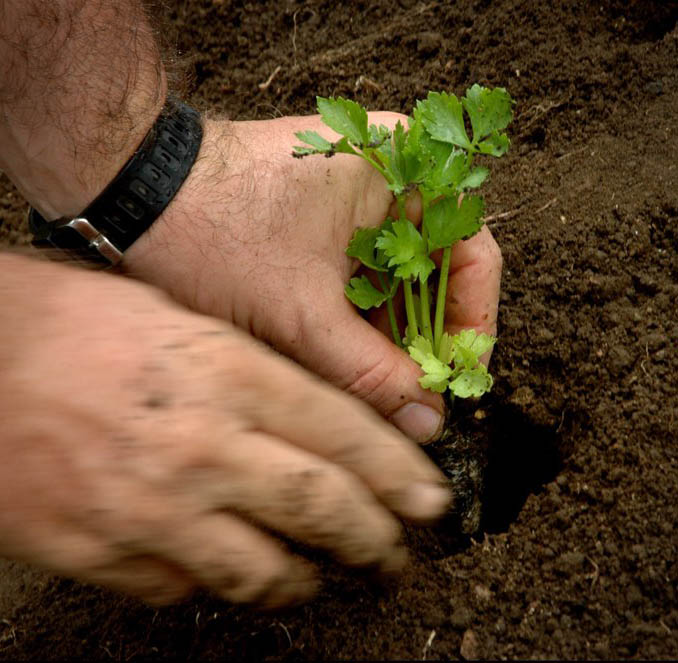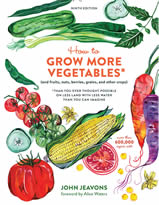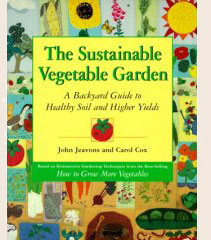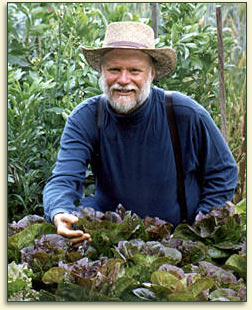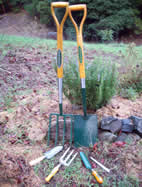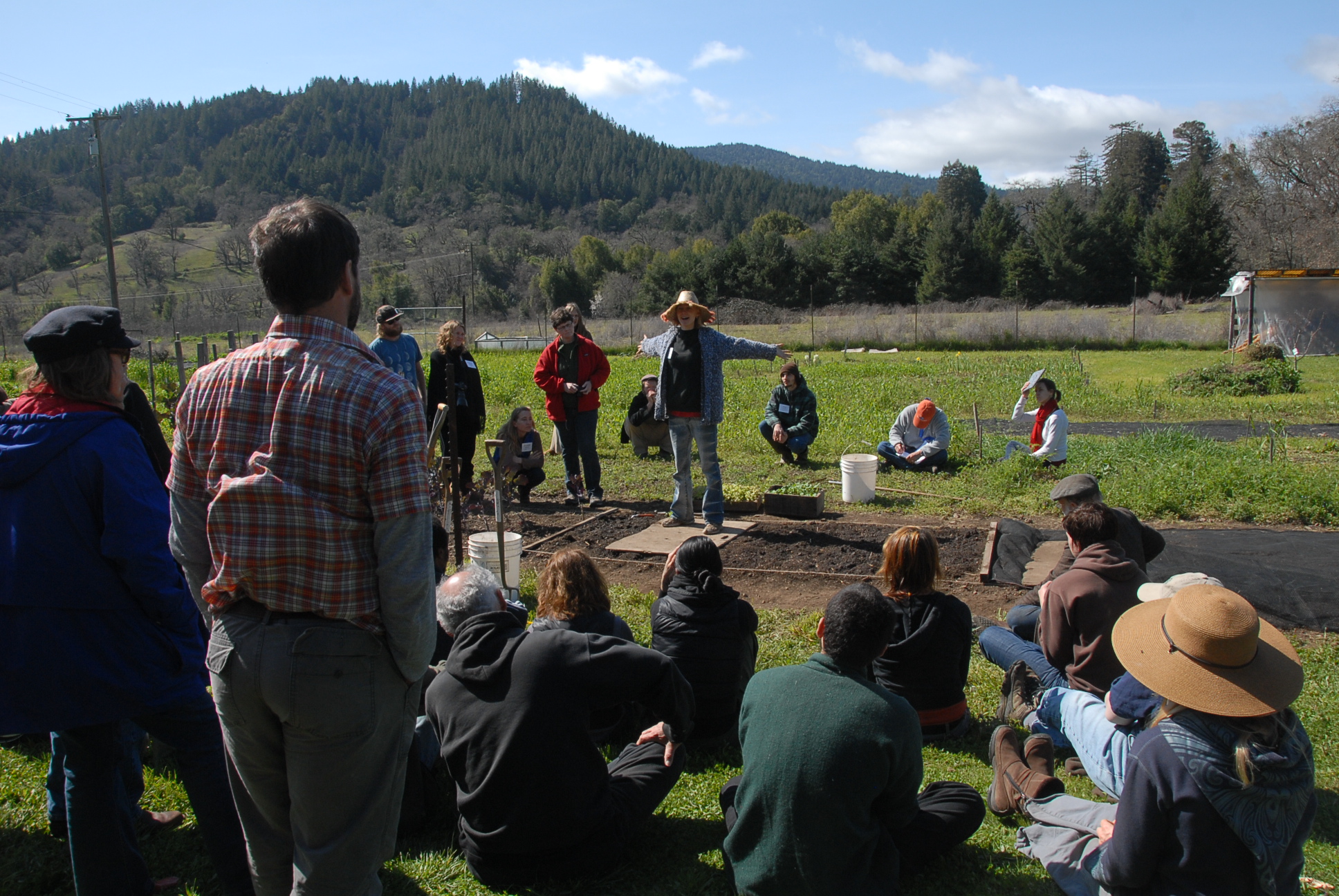Immerse Yourself in the GROW BIOINTENSIVE Lifestyle with our 3-Year Apprenticeship
- Internship
Description
- Internship
Expenses - Internship
Schedule
- Reading
List - Program
Locations - Internship
Application
3-Year Apprenticeship
Applications for the 3-Year Apprenticeship Program are now being accepted:
The apprenticeship will start mid-April 2015
Application Deadline: September 15, 2014
INTRODUCTION
Despite technological advances in agriculture there are still more than 1 billion malnourished people
in the world.1 Rising food prices have led to political unrest in many countries.2 In addition to the
social problems of our global food system, current farming practices are unsustainable. Conventional
agricultural techniques depend heavily on non-renewable resources, outside inputs from other soils,
and degrade farmable soil. The UN Food and Agriculture Organization has stated that the solution to
these problems can be found in small scale, localized, low-input agriculture:
"Global food production is more than enough to feed the global population, the problem is getting it
to the people who need it. In market-marginalized areas, organic farmers can increase food
production by managing local resources without having to rely on external inputs or food distribution
systems over which they have little control and/or access3."
Aware of the intensifying world challenges and the basic need of people to feed themselves, Ecology
Action has been working for over 40 years to develop an elegant, small-scale agricultural system.
This system, known as GROW BIOINTENSIVE, is a high-yielding, sustainable agricultural method
that emphasizes local food production and is based historically on intensive food raising systems.
Ecology Action has a network of affiliate organizations and former interns working around the world
to enable people to promote food security.
The GROW BIOINTENSIVE® method focuses on using small-scale, organic, non-mechanized food-raising
techniques as a way of life. The work we do requires commitment, responsibility, patience, attention to detail,
willingness to follow detailed instructions, self-motivation, and mental and physical stamina. While we do not
wish to discourage those genuinely interested in the program, we also want to make sure that applicants have an
adventurous, hardy nature and can make a dedicated commitment to the program and its unusual living conditions
for the duration of the internship.
ABOUT THESE INTERNSHIPS
Ecology Action offers 6- and 12-month internship programs where participants can get involved in hands-on research
in sustainable agriculture and closed-system food production using the
GROW BIOINTENSIVE Sustainable Mini-Farming technique and
the low-technology lifestyle appropriate to development work. Internships begin in mid-April of each year. For those interested in a more
extended program, a 3 year apprenticeship is also available (click here for more information).
These internships are intended for people
who already have an established understanding of the GROW BIOINTENSIVE method, and want to take their
skills to the next level.
Specifically, we have developed these internships for people who:
- Have already taken a workshop or other course in the GROW BIOINTENSIVE method, or are involved in established projects and programs that use the method;
- Are interested in an in-depth understanding and experience of why GROW BIOINTENSIVE works and how to modify it for other climates, soils and cultures; and
- Expect to be actively involved in public service in this kind of work (with selective preference given to those who have a strong interest in applied sustainable farming and/or demonstrate a significant ability to use the skills they gain through an internship to benefit their communities and the planet).
The internship is a combination of:
- Lecture and demonstrations,
- Study,
- Garden work, and
- Living the method.
This combination is designed is so that participants learn Ecology Action's processes both theoretically and practically, and can understand the processes that are involved in starting this type of work (GROW BIOINTENSIVE farming, low-tech living, teaching the method to others) as well as doing it over the long-term. The internships are an opportunity to assist Ecology Action in accomplishing its work, with both direct and indirect learning occurring in the process.
During the internship, emphasis is placed on the ability of the intern to learn to farm and develop GROW BIOINTENSIVE designs and approaches, in the belief that the most creativity and strength come from people joining forces and working as a team after they have fully developed strength and independence. We have found that skill levels can be dramatically upgraded with this type of training.
Interns are free of administrative responsibilities during the program, and are able to focus on learning through
reading, classes, and work in the research garden. Time is available for an independent study project, and there
are periodic one-hour meetings with an Ecology Action staff member. There are also weekly meetings with staff
and other interns to discuss progress in the research garden. The Interns will take part in seasonal courses and
workshops. Depending on the work done and the level of involvement demonstrated by the intern, it is possible
that the internship can lead to an Ecology Action certification as a GROW BIOINTENSIVE teacher.
The program will take place at Ecology Action's three Research Mini-Farm sites in Northern California. Program interns will learn practical skills that address issues of food insecurity through a combination of hands-on fieldwork and classroom teaching. The techniques taught will be a closed system, soil building, organic approach to food production. In addition interns will learn about positive social solutions to food insecurity.
Ecology Action's garden sites, while beautiful and enjoyable to work in, are first and foremost research gardens where a multitude of experiments are run concurrently. The research focus is on using the GROW BIOINTENSIVE method to conduct scientific tests and collect data to provide solutions to the challenge of creating and maintaining sustainable soil fertility on a closed-system basis, while living a sustainable life. Interns have an opportunity to learn valuable techniques and information, to experience an alternative living style, to make lifelong ties with other interns from different states and countries, and to assist Ecology Action in accomplishing work that can help farmers, gardeners, and communities around the world to raise food, conserve resources and build fertile soil, sustainably.
The program will overlap several of Ecology Action's other, shorter internship programs, hosting farmers and activists from the U.S. and
abroad, which will give all the interns a chance to network with people interested in similar work. The 6- and 12-month programs will also give participants a chance to experience Ecology Action's 3-Day Workshop in November, which is open to the public.
These internships are an opportunity to learn valuable techniques and information, to
experience an alternative living style, to make lifelong ties with other interns from different states
and countries. Interns will be assisting Ecology Action in accomplishing important work that can
help farmers, gardeners, and communities around the world to raise food, conserve resources and
build fertile soil sustainably.
For more information, please download and read the Internship Information Booklet
To fill out an application for the 2014 Internship Session, click here.
1 http://www.bbc.co.uk/news/science-environment-11503845
2 http://www.guardian.co.uk/environment/damian-carrington-blog/2011/aug/25/food-price-arab-middle-eastprotests,
http://www.voanews.com/english/news/middle-east/economy-and-business/2011-Food-Price-Spikes-
Helped-Trigger-Arab-Spring-135576278.html
3 United Nations Food and Agriculture Organization, http://www.fao.org/organicag/oa-faq/oa-faq7/en
6-month and 12-month
GROW BIOINTENSIVE Internships
Estimated Expenses
Since Ecology Action is a small, non-profit organization, financial aid is limited, and this is a fee-based internship,
with cost estimates indicated in the tables on the next page.
Special scholarships or stipends may be available depending on the situation of the applicant (demonstrated
merit and financial need) and the program they are associated with (ability of the applicant to use the skills they
gain through the program to benefit their community and the planet). Funding may be provided by the program
sponsoring the participant, by the participant him/herself, and/or corporations, foundations, and/or individuals.
Please be sure to explore funding through all avenues available to you.
Cost Estimate for a Six-Month Internship at Ecology Action, 2011
Direct Costs |
Interns from the U.S.A. |
Interns from Other Countries |
| Tuition | US$3,000* | US$3,000* |
| Room | 1,200* | 1,200* |
| Food | 900 | 900 |
| Utilities | 300 | 300 |
| Publications | 320 | 320 |
| Supplies | 300 | 300 |
| Phone/Internet | 240 | 240 |
| Incidentals | 1,200 | 1,200 |
| Medical Insurance | 600 | 600 |
| Administration | 1,500* | 1,500* |
| Co-Sponsoring + visa | — | 3,100 |
| Interview Fee | — | 100 |
| SEVIS Form | — | 180 |
| Transportation | 250-500 | 600–2,500 |
| TOTAL | $9,810-10,060 | $13,540-15,440 |
| TOTAL if scholarship is available |
$4,110-4,360 | $7,840-9,740 |
| *Costs waived if scholarship is available. | ||
Cost Estimate for a 12-Month Internship at Ecology Action, 2011
Direct Costs |
Interns from the U.S.A. |
Interns from Other Countries |
| Tuition | US$6,000* | US$6,000* |
| Room | 2,400* | 2,400* |
| Food | 1,800 | 1,800 |
| Utilities | 600 | 600 |
| Publications | 320 | 320 |
| Supplies | 600 | 600 |
| Phone/Internet | 480 | 480 |
| Incidentals | 2,400 | 2,400 |
| Medical Insurance | 1,200 | 1,200 |
| Administration | 3,000* | 3,000* |
| Co-Sponsoring + visa | — | 3,100 |
| SEVIS Form | — | 180 |
| Transportation | 500-1000 | 1,200–5,000 |
| TOTAL | $19,300-19,800 | $23,280-27,080 |
| TOTALS if scholarship is available |
$7,900-8,400 | $11,880-15,680 |
| *Costs waived if scholarship is available. | ||
For more information, please download and read the Internship Information Booklet
Schedule and Routine
Interns will begin their day at 8:30-9am and end from 5:30 to 6:30pm depending on the site. Most days will be spent working in the garden. A typical day could involve preparing beds for planting, seed propagation, harvesting, taking and recording samples, transplanting, seed saving, and other garden tasks. At least one day a week and some times more will be spent in the classroom.
Classroom days will include lectures, discussions and multimedia covering a range of topics. Interns
will have readings and homework to complete each week.
At least one day a week will be spent inside the classroom. The interns will have weekly readings
and homework pertaining to the practical and conceptual aspects of GROW BIOINTENSIVE and
food security issues around the world. Interns will also work in the gardens of the respective sites
and should enjoy physical labor. The experience is demanding but rewarding to those willing to engage
themselves.
SAMPLE DAILY SCHEDULE
(The schedule may be adjusted depending on the weather/season.)
8:00 - 9:00 Breakfast
9:00 - 12:30 Garden Work / Class / Reading
12:30 - 2:30 Spot Watering / Lunch (one hour)
2:30 - 5:30 Garden Work / Class / Reading / Cooking
5:30 - 6:30 Evening Watering / Break *
6:30 - 7:30 Dinner *
7:30 - 9:00 Dishes and Kitchen Clean-up / Evening Watering */Studies and relaxation
At least one and a half days and as much as two days a week will
be free for personal time. In addition to the scheduled "week-ends", each intern receives 7 vacation days in August, at a time that does not
interfere with scheduled classes or garden activities. The internship program is intensive, and other than the designated days off and prearranged
vacation, time is not available for extracurricular sight-seeing, travel or farm visits.If you are interested in travelling while you are in the US,
you should make sure that you schedule any longer trips to occur either before you begin the internship or after
you finish it.
Please note that Ecology Action is a non-profit organization focused on teaching motivated people about
the principles of small scale, sustainable food raising and community involvement. It is not a market
farm. If you are looking for experience in production and marketing on an organic farm, visit
WWOOF or ATTRA. Also, we appreciate that people who are interested in sustainable agriculture
are interested in exploring other methods. Please note though, that this internship will focus primarily
on the GROW BIOINTENSIVE method. For more information about this method click here.
Curriculum
Click here to download a sample class schedule, publication list and reading schedule from the 2012 6-month internship program.
Follow-Up Activities
It is expected that Ecology Action interns are prepared to continue and/or initiate GROW BIOINTENSIVE
mini-farms, classes, and other related activities for at least two years following the internship. During the period
of the internship, participants will be able to work with a staff member to plan their future activities program.
Those interns wishing to become GROW BIOINTENSIVE certified teachers should read Ecology Action Booklet
#30 which you can download by clicking here.
Reading List
This course will be fast-paced, and will cover a lot of material. In order to facilitate a deeper understanding of the material, participants will be required to do additional readings and watch instructional videos before the first class, and between subsequent classes.
The readings will cover the scientific basis for and findings of GROW BIOINTENSIVE, the details of how to use various GB techniques, as well as the global and local need for transformation of our food-raising systems. For a detailed sample reading schedule, download the Internship Information Booklet.
- WORKSHOP MANUAL for 6-Month Course
- ECOLOGY ACTION PUBLICATIONS:
How to Grow More Vegetables, 8th ed. [SP]
Self-Teaching Mini-Series Booklets:
The Sustainable Vegetable Garden
The Backyard Homestead, Mini-Farm & Garden Log Book
One Circle
Future Fertility
#0 —Biointensive Mini-Farming: A Rational Use of Natural Resources [SP]
#1— Cucumber Bonanza [SP]
#11 —Examining the Tropics [SP]
#12 —Growing and Gathering Your Own Fertilizer
#13 —Growing to Seed [SP]
#14 —The Complete 21-Bed Biointensive Mini-Farm [SP] /
#15 —One Basic Mexican Diet [SP]
#17 —Garden Research for Food and Flavor [SP]
#18 —Dried, Cut and Edible Flowers for Pleasure, Food and Income
#19 —Biointensive Micro-farming: A Seventeen Year Perspective [SP]
#21 —Micro-Farming as a Key to the Revitalization of the World's Agriculture
#24 —Comprehensive Definition of Sustainability [SP]
#25 —One Basic Kenyan Diet
#26 —Learning How to Grow All Your Own Food A Supplement for Booklet 14
#27 —Growing Medicinal Herbs in as Little as Fifty Square Feet — Uses and Recipes
#28 —The Smallest Possible Area to Grow Food and Feed
#29 —Test Your Soil with Plants
#30 —GROW BIOINTENSIVESM Sustainable Mini-Farming Teacher-Training & Certification Prog.
#31 —Designing a GROW BIOINTENSIVE® Sustainable Mini-Farm
#32 —GROW BIOINTENSIVE® Composting and Growing Compost Materials
#33 —Grow Your Own Grains
#34 — Food for the Future, Now
#35 Low-Natural Rainfall Growing
#36 An Experimental Complete 33 Bed GROW BIOINTENSIVE® Mini-Farm: Fertility, Nutrition, & Income
# 37 Learning How to Grow All Your Own Food —
PB #1 —Another Way to Wealth
GROW BIOINTENSIVE Apprenticeship Possibilities (booklet)
Composting for the Tropics (booklet)
DVD- GROWBIOINTENSIVE A Beginner’s Guide in 8 Easy Sessions
- OTHER Publications:
Seed to Seed, 2nd ed., Suzanne Ashworth, 2002.
Saving Seeds, Marc Rogers, 1990.
- Possible references to consult after completing the internship:
World Vegetables , 2nd ed., by Vincent Rubatzky and Mas Yamaguchi. Chapman and Hall, 1997.
Cereal Crops by Warren H. Leonard and John H. Martin. Macmillan, 1963.
East African Crops by J. D. Acland. Longman, 1971.
Program Sites
The program will take place at three different sites in Northern California. Each site is unique in climate, soil, living situation, and history. While you can indicate a site preference during the application process, we cannot guarantee that you will be placed at your preferred site.
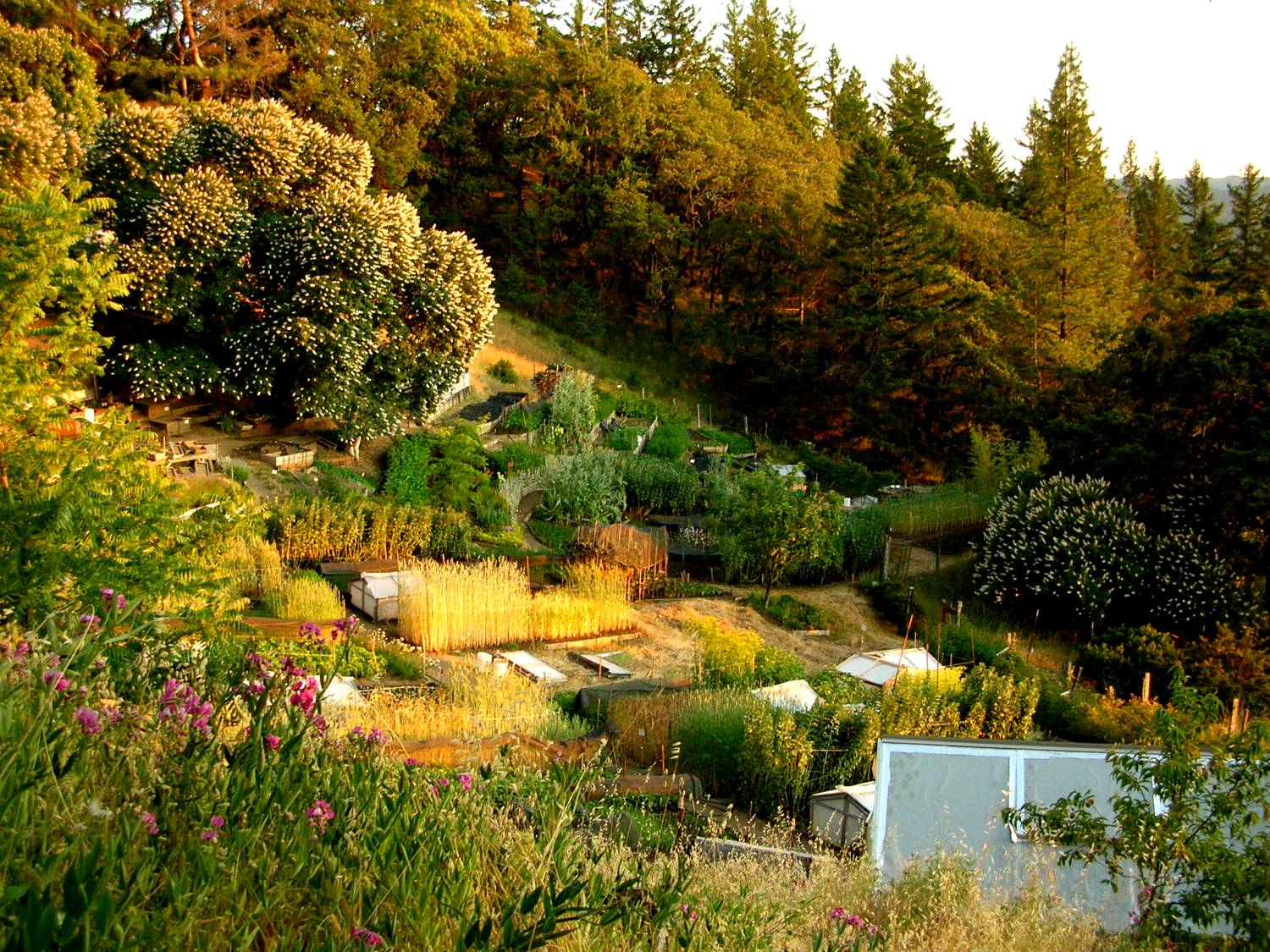
Ecology Action's Common Ground Research Garden (Willits, CA)
The setting at this site is rural and rustic. The Ecology Action mini-farm provides a demonstration of
what is possible when conditions are less than optimal. The one-third-acre mini-farm/garden is
located on a 20-acre site that offers a challenging soil situation on a mountainside slope. Basic fieldtesting
compares different cultivars, nutrient and compost amounts, crop spacing, and other practices.
Also, there are usually a variety of crops grown out to seed for Bountiful Gardens, our international
mail order company. The soil at this site is rated fair for grazing and has a level of magnesium,
nickel, and other minerals that would normally prevent the growing of crops. In addition, it has cool
nighttime temperatures and varied mini-climates within its growing area. GROW BIOINTENSIVE
practices are buffering these limitations, and food is being grown (although lower-than-normal
GROW BIOINTENSIVE yields were initially and are often still obtained). Ground was broken for
the Biointensive research garden in 1982. It took 14 years of soil improvement (from 1982 to 1995)
to develop a soil system that produces healthy plants and satisfactory yields at this location.
Golden Rule Community Garden (Willits, CA)
This training site is a joint program with the Christ Church of the Golden Rule Community just south
of Willits, CA and Ecology Action. The Golden Rule Community mini-farm/garden is located on
Ridgewood Ranch, a 5,000-acre home to the Golden Rule Community, a therapeutic riding program,
a large heard of free-range cattle, and acres of wilderness. The one-acre garden site has been
organically cultivated for over 30 years and in 2001 adopted the Biointensive methods of food
raising. Due to its location within a large alluvial flood plane, the garden contains fluffy, rich,
uniform soil on flat terrain that lead to good garden yields. While the climate provides slightly
warmer temperatures for growing throughout the day than our other Willits site, at night the cool air
settles in the valley creating a difficult temperature swing daily. Its main focus is on providing food
for the Golden Rule Community, growing an array of seeds for Bountiful Gardens, and training
interns and other visitors in Biointensive gardening. It also has the unique opportunity to focus on
low-tech alternative technology and processing within the garden and for cleaning seeds. The
Golden Rule mini-farm demonstrates what is possible using GROW BIOINTENSIVE under
reasonably good conditions and in the summer is a treat for anyone to see! It is beneficial for the
training of trainers and staff for projects focusing on production mini-farming and development minifarming
in this and other countries.
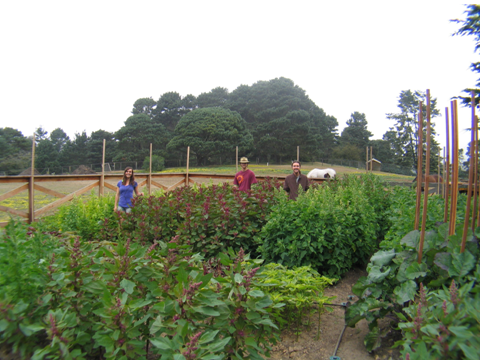
The Green Belt (Mendocino, CA)
The Greenbelt Program site in Mendocino, California is situated on the grounds of the Stanford Inn,
an eco-resort nestled on the cliffs overlooking the confluence of the Big River and the Pacific Ocean.
Our program is focused on: developing the GROW BIOINTENSIVE model for our coastal, cool,
foggy climate, improving the soil and teaching the GROW BIOINTENSIVE method. There are
many challenges at the site that create opportunities to demonstrate practical and effective ways of
maximizing resources and managing fertility. There is an inherently good soil here but it underwent
years of compaction as a horse paddock. We are working to build soil structure and fertility to restore
the soil health. We experiment with growing complete diets and different crop varieties to find which
are best suited to this unique growing climate. Our internships are unique and offer a great
experience in water conservation, soil fertility management and food raising through the GROW
BIOINTENSIVE method.
6-12 Month Internship Application
Your internship application must be sent by the application deadline of September 15, 2013, but participants are encouraged to apply as early as possible.
Space is limited. The Ecology Action staff will select applicants on the basis of the impact their work is likely to have in the future; priority will be given to those with a goal of using GROW BIOINTENSIVE Mini-Farming practices in outreach and public service projects.
Applicants should note that this is an unpaid, fee-based internship program, but that scholarships and financial assistance may be provided to promising students who cannot afford the fees. Program interns will be placed at three different project sites in Northern California. Housing /accommodations and basic meals will be provided at each site; however, other expenses will need to be provided by intern, as follows. (Please note that these internship fees are non-refundable.)
To Apply:
- Download and read the Internship Information Booklet
- Download and print out the Internship Medical Report Form and take it to your doctor to fill out. You must have this form completed and signed by a medical doctor before you apply for this internship. Applications without a completed Medical Report Form will not be considered.
When you have the competed form, you or your doctor can either:
FAX it to us at +1-707-459-5409
-OR-
Scan it and send it via email as a JPEG or a PDF to contact@growbiointensive.org
In either case, please make sure to include "Internship Application Medical Form for {applicant's name}" as the subject line in the fax or email, so that we know who the form belongs to.
- Gather three letters of reference from people who can attest that you have what it takes to complete this internship successfully. Teachers, employers, and collegues are examples of good references. These letters can be faxed to +1-707-459-5409 or, emailed to contact@growbiointensive.org.
Please make sure that you (or your references, if the letters are coming directly from them) add "Internship Application Reference Letter for {applicant's name}" in the subject line of the fax or email so that we know who the form belongs to.
- Complete the Online Internship Application Form (our secure online registration form, hosted by FormSpring will open in a new window).
- Once you are accepted, pay for tuition and fees. The decision date for this internship is June 15, 2013. You will be notified whether you have been accepted, and if you have, you will be provided with further information on how to proceed.
***Important Note***: Please remember that scholarships are often available for promising interns. Don't let the price of the internship keep you from applying! We will do all we can to make sure that the best applicants are able to come work with us.
